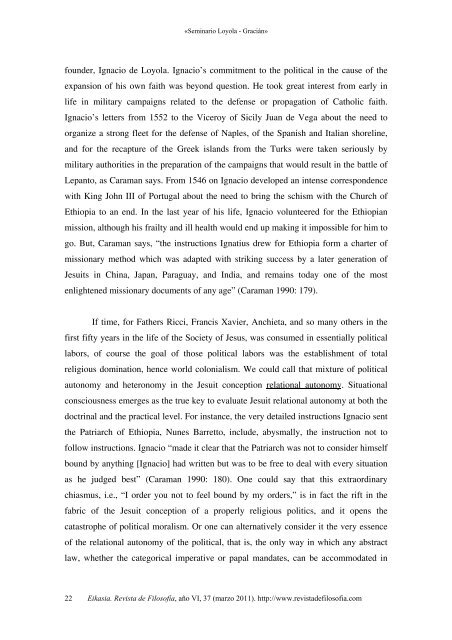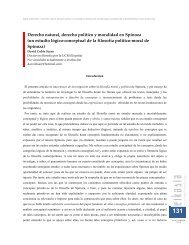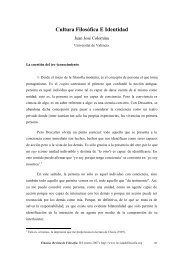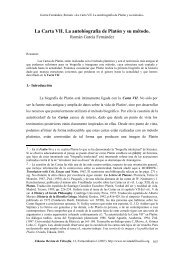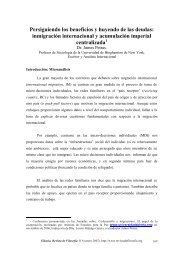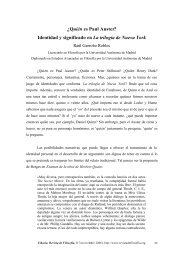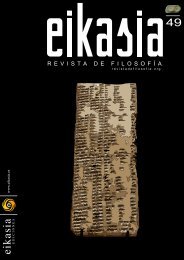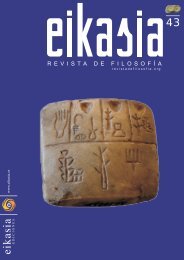Descargar número completo (3,83 MB) - Eikasia
Descargar número completo (3,83 MB) - Eikasia
Descargar número completo (3,83 MB) - Eikasia
You also want an ePaper? Increase the reach of your titles
YUMPU automatically turns print PDFs into web optimized ePapers that Google loves.
«Seminario Loyola - Gracián»<br />
founder, Ignacio de Loyola. Ignacio’s commitment to the political in the cause of the<br />
expansion of his own faith was beyond question. He took great interest from early in<br />
life in military campaigns related to the defense or propagation of Catholic faith.<br />
Ignacio’s letters from 1552 to the Viceroy of Sicily Juan de Vega about the need to<br />
organize a strong fleet for the defense of Naples, of the Spanish and Italian shoreline,<br />
and for the recapture of the Greek islands from the Turks were taken seriously by<br />
military authorities in the preparation of the campaigns that would result in the battle of<br />
Lepanto, as Caraman says. From 1546 on Ignacio developed an intense correspondence<br />
with King John III of Portugal about the need to bring the schism with the Church of<br />
Ethiopia to an end. In the last year of his life, Ignacio volunteered for the Ethiopian<br />
mission, although his frailty and ill health would end up making it impossible for him to<br />
go. But, Caraman says, “the instructions Ignatius drew for Ethiopia form a charter of<br />
missionary method which was adapted with striking success by a later generation of<br />
Jesuits in China, Japan, Paraguay, and India, and remains today one of the most<br />
enlightened missionary documents of any age” (Caraman 1990: 179).<br />
If time, for Fathers Ricci, Francis Xavier, Anchieta, and so many others in the<br />
first fifty years in the life of the Society of Jesus, was consumed in essentially political<br />
labors, of course the goal of those political labors was the establishment of total<br />
religious domination, hence world colonialism. We could call that mixture of political<br />
autonomy and heteronomy in the Jesuit conception relational autonomy. Situational<br />
consciousness emerges as the true key to evaluate Jesuit relational autonomy at both the<br />
doctrinal and the practical level. For instance, the very detailed instructions Ignacio sent<br />
the Patriarch of Ethiopia, Nunes Barretto, include, abysmally, the instruction not to<br />
follow instructions. Ignacio “made it clear that the Patriarch was not to consider himself<br />
bound by anything [Ignacio] had written but was to be free to deal with every situation<br />
as he judged best” (Caraman 1990: 180). One could say that this extraordinary<br />
chiasmus, i.e., “I order you not to feel bound by my orders,” is in fact the rift in the<br />
fabric of the Jesuit conception of a properly religious politics, and it opens the<br />
catastrophe of political moralism. Or one can alternatively consider it the very essence<br />
of the relational autonomy of the political, that is, the only way in which any abstract<br />
law, whether the categorical imperative or papal mandates, can be accommodated in<br />
22 <strong>Eikasia</strong>. Revista de Filosofía, año VI, 37 (marzo 2011). http://www.revistadefilosofia.com


